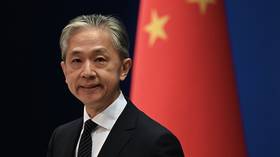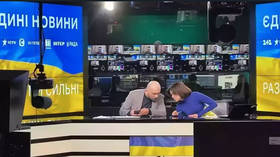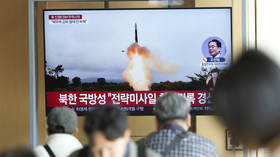US ‘shooting itself in the foot’ by arming Taiwan – Beijing

Washington’s latest decision to supply arms to Taiwan increases the risks faced by the self-governed island instead of bolstering its security, according to the Chinese Foreign Ministry.
Taipei is set to get $8 billion in security assistance under a bill recently approved by the US Congress. The US decision to arm what it recognizes offficially as a part of China was met with resignation in Beiging, with Wang Wenbin, the spokesman for the Chinese Foreign Ministry, criticizing the decision during a press briefing on Wednesday.
“It will only increase tensions and the risk of conflict across the Taiwan Strait, and will ultimately be an act of shooting oneself in the foot,” he warned.
Congress approved $95 billion in foreign aid, most of it military, on Tuesday, with most of the spending related to Ukraine. President Joe Biden is set to sign the bill into law this week.
Taiwan was the last refuge of nationalist forces during the Chinese civil war of the 1940s, and has since remained de facto independent from Beijing and allied with Washington. The One-China policy, which forms the core of its government’s relationship with Taiwan, states that there is only one Chinese national state.
Under the policy, Beijing seeks the peaceful reintegration of the island and the prevention of any attempt to declare it a sovereign nation, threatening the use of military force if necessary. China has claimed that some political forces in the US are encouraging Taipei to secede, and that the military support offered by Washington fuels separatist sentiments which are part of a US strategy to contain Beijing.
Military ties with the US cannot “save the doomed fate of Taiwan independence,” Wang warned, urging Washington not to create new tensions in the region with its arms supplies.
The rebuke coincided with the arrival of US Secretary of State Antony Blinken in China for a three-day visit. According to Western media, one of his key goals is to put pressure on Beijing over its friendly relations with Moscow, and its decision to reject economic restrictions on Russia relating to the Ukraine crisis.
“We see China sharing machine tools, semiconductors, other dual-use items that have helped Russia rebuild the defense industrial base,” Blinken stated last week after a G7 meeting.
The US is drafting measures to punish Chinese banks involved in such trade, and Blinken intends to use that threat as “diplomatic leverage” during the talks, according to the Wall Street Journal.












